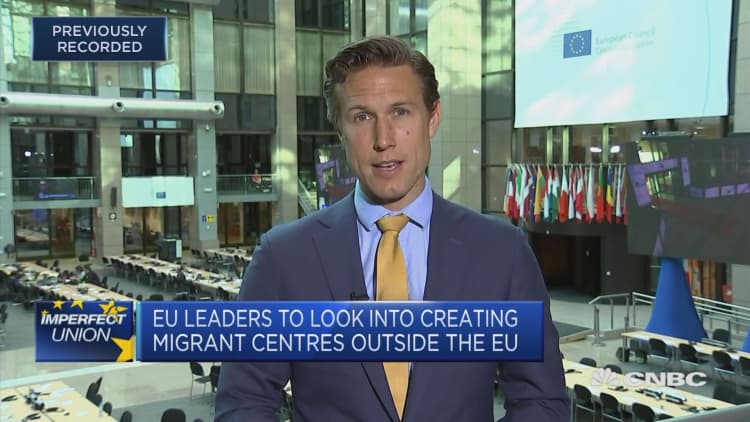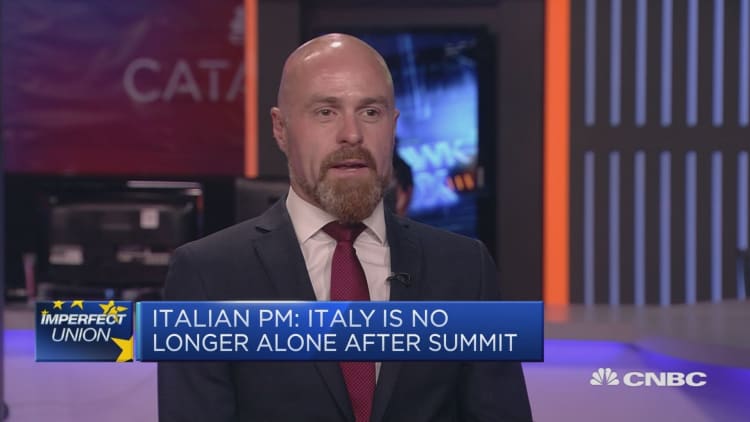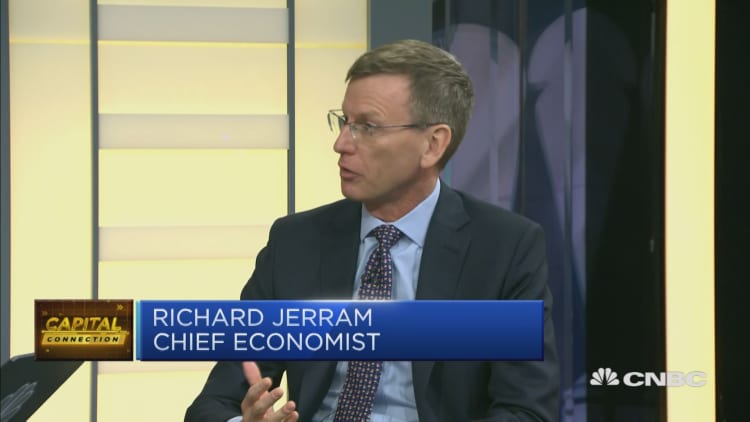
European leaders have hashed out a deal on migration that should satisfy the Italian government's hardline approach and stave off a potential collapse of Angela Merkel's coalition in Germany.
The decision, announced Friday morning, was greeted positively by non-governmental groups focused on migration, including the UN's International Organization of Migration, which said it was "very pleased at the solidarity and consensus" that emerged overnight.
But some in Europe cautioned the agreement achieved the bare minimum for reasons of political expediency and did little to solve long-term challenges, including an unequal sharing of migration's burdens among European nations that has bedeviled the bloc in recent years.
Lithuanian President Dalia Grybauskaite acknowledged as much in an interview with CNBC on Friday, using the kind of diplomatic language that is so prevalent in Brussels. "Today," she said, "it is a compromise, and maybe the pace of reforms is slower than we expected."
Several European leaders had told CNBC ahead of the marathon 10-hour meeting that they were not optimistic about reaching a deal. But in the early hours of Thursday morning, European Council Donald Tusk announced that all 28 leaders had signed off on a raft of new measures that were focused on strengthening both the bloc's external borders and its internal controls.
The agreement vowed to crack down aggressively on those involved in trafficking operations in Libya and elsewhere, while increasing support for the Libyan coastguard and boosting funds for affected communities. This will likely include regions like Sicily and remote Italian islands such as Lampedusa that have been frontline destinations for many migrant entries into Europe.

There was also an apparent fop to Italy's new interior minister Matteo Salvini, who has burnished his political reputation as leader of the right-wing Lega party through criticism of Brussels' approach to migration and a perceived lack of funding support for Italy.
The text included a line that vessels operating in the Mediterranean Sea must "not obstruct operations of the Libyan Coastguard." On a recent visit to the Libyan capital Tripoli, Salvini repeated his long-held view that NGO vessels — responsible for rescuing hundreds of thousands of floundering migrants in recent years — provided a figurative but illegal "bridge" to Europe, and should cede patrols in North African coastal waters to local enforcement authorities.
Emmanuel Macron hailed the "European cooperation" that had allowed the often divergent viewpoints from across the continent to find some common ground. But it was clear that it was the Italian authorities who had won the greatest number of concessions, after their delegation had proved particularly intransigent before and during the night of talks.
Italian premier Giuseppe Conte left the meeting happy, saying that "Italy is no longer alone."
Elsewhere in the Mediterranean basin, greater numbers of migrants have been arriving in Spain from Morocco. Both those countries would receive ramped-up support under the terms of this deal, a move that will please Spain's new socialist leader Pedro Sanchez.
Many officials have highlighted the EU's agreement with Turkey on migration as a success story that could be replicated elsewhere, but the Council was at pains to include in the final text an insistence that Turkish authorities must completely halt migrant crossings into Greece, and prevent any new migrant routes — by sea or by land — from appearing.
The European Commission has separately been granted approval to spend a further 500 million euros on various initiatives in Africa, with a plan for EU member states to match that contribution in the coming months. Those efforts are designed to reduce the so-called "push factors" that drives some migrants to make the hazardous journey north across the Sahara and Mediterranean to the European Union.
In terms of the "pull factors" that European politicians see as incentivising economic migrants — as opposed to asylum seekers, who will still be afforded all legal protections due to them — this new plan calls for the establishment of processing centers in non-EU countries.

Search and rescue vessels that pluck migrants from the seas would theoretically ensure their passengers disembark at these locations, where authorities could then assess each new arrival's status.
Those that do successfully make it to European territory would be handled through a shared effort by those member states who are willing to accept them. This should provide an opportunity for countries like Germany to make bilateral agreements on resettlement quotas, but could also become a focus of future divisions.
Chancellor Merkel acknowledged after the talks ended that there was still "a lot of work to do to bridge the different views," but said it was "a good signal that we agreed on a common text." She will return to Berlin later today to face a weekend of further migration-focused talks with her coalition partner, CSU leader Horst Seehofer.
This summit agreement will help Merkel, according to analysts. "Positive," said Carsten Nickel of Teneo Intelligence. "It will likely be just enough to calm the mood for now."

